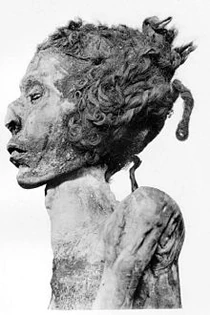(Adding categories) |
No edit summary |
||
| (One intermediate revision by the same user not shown) | |||
| Line 9: | Line 9: | ||
|dates =22nd Dynasty |
|dates =22nd Dynasty |
||
|site = DB320, Deir El-Bahari |
|site = DB320, Deir El-Bahari |
||
| − | |location = |
+ | |location = Museum of Egyptian Antiquities, Cairo, Egypt. |
| ⚫ | |||
| − | |catalogue = }} |
||
| ⚫ | |||
| − | 19.1875px;"> </span> |
||
| ⚫ | '''Djedptahiufankh''' served as the Fourth Prophet of Amun. He was the husband of Nestanebtishru during the reign of Pharaoh Shoshenq I, founder of the 22nd Dynasty of Egypt. Consequently, he was one of the most important state officials at Thebes after this king's own son, the High Priest of Amun, Iuput A. |
||
| − | ==Biography== |
||
| − | |||
| ⚫ | Djedptahiufankh served as the |
||
==Mummification== |
==Mummification== |
||
| − | He was buried in Deir El-Bahari Tomb 320 or DB320, which actually served as the family tomb of the 21st Dynasty High Priest Pinedjem. DB320 was discovered in the 19th century and quickly became famous for containing a cache of many of the most significant New Kingdom royal mummies including the mortal remains of Amenhotep I, |
+ | He was buried in Deir El-Bahari Tomb 320 or DB320, which actually served as the family tomb of the 21st Dynasty High Priest Pinedjem. DB320 was discovered in the 19th century and quickly became famous for containing a cache of many of the most significant New Kingdom royal mummies including the mortal remains of [[Amenhotep I]], [[Ramesses II]],[[ Ramesses III]],[[ Ramesses IX]], and [[Thutmose I]], [[Thutmose II]] and [[Thutmose III]]. |
Three separate mummy bandages dating to Years 5, 10 and 11 of Shoshenq I were found on Djedptahiufankh's body. Djedptahiufankh's burial was found intact and undisturbed, and his mummy was unwrapped by Gaston Maspero in 1886. |
Three separate mummy bandages dating to Years 5, 10 and 11 of Shoshenq I were found on Djedptahiufankh's body. Djedptahiufankh's burial was found intact and undisturbed, and his mummy was unwrapped by Gaston Maspero in 1886. |
||
| + | |||
| − | [[File:Djedptahiufankh small.jpg|thumb|302x302px]] |
||
==References== |
==References== |
||
https://en.wikipedia.org/wiki/Djedptahiufankh |
https://en.wikipedia.org/wiki/Djedptahiufankh |
||
| + | |||
| + | https://www.sciencephoto.com/media/414271/view/djedptahiufankh-mummy-egypt |
||
[[Category:Egyptian Mummies]] |
[[Category:Egyptian Mummies]] |
||
Latest revision as of 21:06, 4 March 2020
Djedptahiufankh served as the Fourth Prophet of Amun. He was the husband of Nestanebtishru during the reign of Pharaoh Shoshenq I, founder of the 22nd Dynasty of Egypt. Consequently, he was one of the most important state officials at Thebes after this king's own son, the High Priest of Amun, Iuput A.
Mummification
He was buried in Deir El-Bahari Tomb 320 or DB320, which actually served as the family tomb of the 21st Dynasty High Priest Pinedjem. DB320 was discovered in the 19th century and quickly became famous for containing a cache of many of the most significant New Kingdom royal mummies including the mortal remains of Amenhotep I, Ramesses II,Ramesses III,Ramesses IX, and Thutmose I, Thutmose II and Thutmose III.
Three separate mummy bandages dating to Years 5, 10 and 11 of Shoshenq I were found on Djedptahiufankh's body. Djedptahiufankh's burial was found intact and undisturbed, and his mummy was unwrapped by Gaston Maspero in 1886.
References
https://en.wikipedia.org/wiki/Djedptahiufankh
https://www.sciencephoto.com/media/414271/view/djedptahiufankh-mummy-egypt
